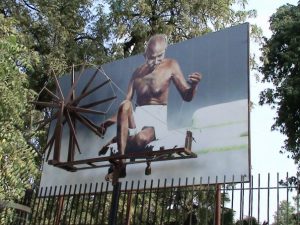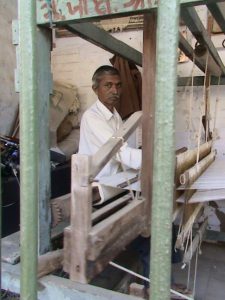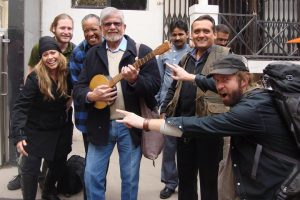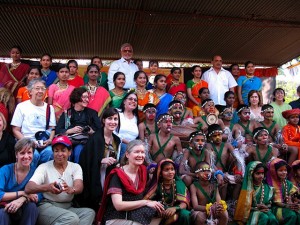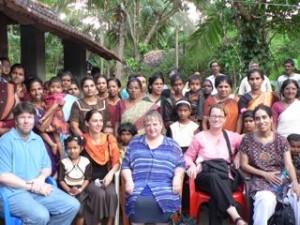 Today is Blog Action Day, and Global Exchange is a proud Partner. Blog Action Day is an event that happens each year when bloggers from around the world blog about the same issue to raise awareness and hopefully generate a global discussion around that issue.
Today is Blog Action Day, and Global Exchange is a proud Partner. Blog Action Day is an event that happens each year when bloggers from around the world blog about the same issue to raise awareness and hopefully generate a global discussion around that issue.
This Blog Action Day the issue is food, (today is also World Food Day) so Global Exchange’s Reality Tours Director Malia Everette takes you on a journey “From Sacred Seeds and Abundant Reads to Food Sovereignty Movement Building”…
—
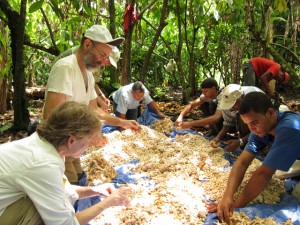 Whether we know it or not, we transmit the presence of everyone we have ever known, as though by being in each other’s presence we exchange our cells, pass on some of our life force, and then we go on carrying that other person in our body, not unlike springtime, when certain plants in fields we walk through attach their seeds in the form of small burrs to our socks, our pants, our caps, as if to say, ‘Go on, take us with you, carry us to root in another place.’ This is how we survive long after we are dead. This is why it is important who we become, because we pass it on. –Natalie Goldberg
Whether we know it or not, we transmit the presence of everyone we have ever known, as though by being in each other’s presence we exchange our cells, pass on some of our life force, and then we go on carrying that other person in our body, not unlike springtime, when certain plants in fields we walk through attach their seeds in the form of small burrs to our socks, our pants, our caps, as if to say, ‘Go on, take us with you, carry us to root in another place.’ This is how we survive long after we are dead. This is why it is important who we become, because we pass it on. –Natalie Goldberg
I grew up with a back yard garden where it was normal to delight in picking berries and tomatoes off the vine after school as a child. Each bite, each harvest imparted an intrinsic learning about the cycles of the earth and about the complexity of each ecosystem. Little did I know that saving my favorite pumpkin seed would symbolize so much to me later on in life. Today as a mother, educator and advocate I try to provide these opportunities to my sons. They know that food is sacred and that the seeds we choose are chosen with love…and cherished.
At times I am asked how I became active in social justice and why I have for decades worked in solidarity against the “Green” and now, “Green Gene Revolution” and while there are a plethora of reasons, today on this global day to blog about FOOD I ‘d like to give credit where it is due and honor two phenomenal food advocate heroines that remarkably influenced my knowledge and life patch path!
As a graduate student back in the early 1990’s I heard Dr. Vandana Shiva speak at the Bioneers conference. I left totally blown away by her intelligence, message and science. It in fact inspired me in my coursework and actually propelled me to dedicate my thesis, The Monoculturization of International Bio-relations: SocioEcological Implications of the WTO, SAPs and IPRs. I continue to read almost everything I can by her and truth be told her analysis on global politics, ecology and power relations has greatly contributed to the many programs I have been blessed to create here at Reality Tours since 1997. In fact one of my personal Reality Tours highlights was spending January 1st, 2010 on Vandana’s farm, Naydanya. She spent the day educating and engaging with Dr. Arun Gandhi and the delegates on our annual Gandhian Legacy tour to India.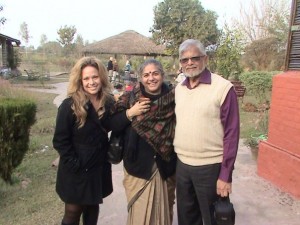
Today I encourage you to learn more about the vulnerability of the food system. As Vandana states in one article:
We are in a food emergency. Speculation and diversion of food to biofuel has contributed to an uncontrolled price rise, adding more to the billion already denied their right to food. Industrial agriculture is pushing species to extinction through the use of toxic chemicals that kill our bees and butterflies, our earthworms and soil organisms that create soil fertility. Plant and animal varieties are disappearing as monocultures displace biodiversity. Industrial, globalized agriculture is responsible for 40 percent of greenhouse gases, which then destabilize agriculture by causing climate chaos, creating new threats to food security. But the biggest threat we face is the control of seed and food moving out of the hands of farmers and communities and into a few corporate hands. Monopoly control of cottonseed and the introduction of genetically engineered Bt cotton has already given rise to an epidemic of farmers’ suicides in India. A quarter-million farmers have taken their lives because of debt induced by the high costs of nonrenewable seed, which spins billions of dollars of royalty for firms like Monsanto.
After hearing the message of Vandana, I started researching. That is actually when I found out about an organization called Food First and the work of Frances “Frankie” Moore Lappé . Frances “Frankie” Moore Lappé and Joseph Collins co-founded the Institute for Food and Development Policy, nicknamed Food First, in 1975. Frankie’s book, Food First: Beyond the Myth of Scarcity, opened my mind dramatically. I realized I was no longer a Malthusian. In fact food became something I never took for granted again and I gave up ‘fast food’. This introduction to Food First actually has become life long. I serve on their Board of Directors and am so honored to be a part of an organization that continues to be out front on issues such as genetically modified foods, agrofuels, labor rights and land grabs. The institute uses critical food justice and food sovereignty frameworks to offer analyses and transformative solutions for eliminating the injustices that cause hunger.
Thus today I want to thank Vandana and Francis, thank organizations like Bioneers, IFG, Global Exchange, Food First, Food and Water Watch and Slow Food that have inspired (though they may not know it!) a collaborative new form of alternative tourism….Food Sovereignty Tours.
First defined by Vía Campesina in 1996, Food Sovereignty is “People’s right to healthy and culturally appropriate food produced through ecologically sound and sustainable methods, and their right to define their own food and agriculture systems.”
Food Sovereignty Tours offer you a way to explore the realities of today’s global food system and to connect with the global movement for food sovereignty. This travel program is a project of Food First/Institute for Food & Development Policy in partnership with Global Exchange’s Reality Tours. The combined expertise of these two organizations will get you to the front lines of the world’s food sovereignty frontiers, to meet local farmers, activists, policymakers, and local consumers. We are here to share with you our 35 years of knowledge and contacts, to facilitate powerful cultural exchange and learning, and to connect the global food movement.
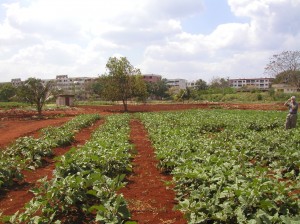 Today as we celebrate that perfect biodynamic glass of wine, that fabulous organic strawberry or that ritual meal with loved ones at your table may we all reflect and embrace the domestic and global food sovereignty movement that celebrated the rights and the freedom to grow diverse and nutritious food. May you do one thing to protect and advocate for the right to have access to save healthy adequate and affordable food.
Today as we celebrate that perfect biodynamic glass of wine, that fabulous organic strawberry or that ritual meal with loved ones at your table may we all reflect and embrace the domestic and global food sovereignty movement that celebrated the rights and the freedom to grow diverse and nutritious food. May you do one thing to protect and advocate for the right to have access to save healthy adequate and affordable food.
Interested in reading other food-themed blog posts? Check out our People to People blog post about food justice today called “Food Justice: The Nature of Farming and the Farming With Nature.” For more food-themed blog posts go the Blog Action Day website for a list of blogs taking part in Blog Action Day today.

